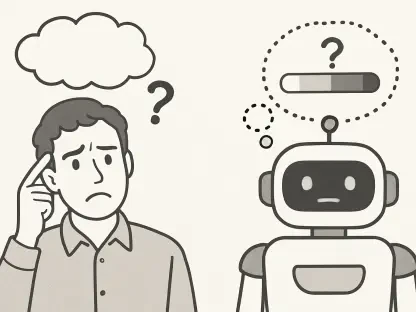Imagine a world where a simple spoken command can schedule a doctor’s appointment, draft a business email, or even guide an augmented reality experience—all without lifting a finger, transforming the way we interact with technology. Voice AI has swiftly evolved into a cornerstone of modern technology, reshaping how humans interact with devices and systems in both personal and professional realms. This transformative power is evident across industries, from healthcare to entertainment, where voice-driven solutions are enhancing efficiency and accessibility. Yet, as this technology surges forward, it brings with it a complex web of ethical questions and societal implications that demand attention. Delving into the latest advancements, the moral challenges, and the potential future of voice AI reveals a landscape brimming with opportunity, but also fraught with responsibility.
Cutting-Edge Developments in Voice AI
Breakthroughs in Natural Speech Technology
The rapid progress in voice AI is largely driven by innovations in natural language processing and machine learning, resulting in speech that feels remarkably human. Advanced models, such as updated frameworks for voice synthesis, are delivering tones and inflections that mimic real conversation, making interactions with virtual assistants more intuitive. This leap forward is empowering applications in telemedicine, where patients can describe symptoms to a voice-activated system for preliminary assessments, and in customer service, where automated agents handle inquiries with a personal touch. Such technology not only slashes operational costs for businesses but also elevates user satisfaction by replacing clunky text interfaces with seamless spoken dialogue. Industry insights shared on social platforms highlight how these tools are breaking down barriers, enabling faster communication compared to traditional input methods and opening up new possibilities for mobile device usage.
Expanding Accessibility for Developers and Businesses
Another pivotal advancement lies in the democratization of voice AI tools, making high-quality solutions accessible to a broader range of developers and enterprises. Open-source models for text-to-speech and real-time voice processing are lowering the entry threshold, allowing startups to integrate sophisticated voice features without hefty investments. This accessibility fuels innovation across sectors like education, where voice-driven tutors assist students in real-time, and entertainment, where interactive storytelling adapts to a user’s spoken input. Competitive market dynamics, spurred by significant API breakthroughs, are pushing companies to refine their offerings continuously. The result is a vibrant ecosystem where both large corporations and nimble startups contribute to a wave of automation and personalization, embedding voice AI deeper into everyday operations and consumer experiences, as noted by tech leaders discussing trends on digital forums.
Navigating Challenges and Future Horizons
Ethical Dilemmas and Societal Implications
As voice AI becomes ubiquitous, ethical concerns are emerging as a critical area of focus, particularly around the potential loss of individuality in communication. There’s a growing worry that standardized speech patterns, influenced by widely used AI tools, might erode unique linguistic traits among users. Additionally, the risk of misinformation propagated through voice interfaces poses a threat to trust in various sectors, from media to education. Privacy remains a pressing issue, with fears over data security and unauthorized recordings lingering in public discourse. Technical challenges, such as accent biases in recognition systems and the demand for low-latency responses, further complicate deployment. Experts stress the importance of addressing these hurdles to ensure that voice AI serves diverse populations equitably, advocating for frameworks that prioritize inclusivity and safeguard personal information against misuse.
Shaping Tomorrow’s Digital Interactions
Looking ahead, the integration of voice AI with emerging technologies like augmented reality promises to redefine digital engagement, creating immersive environments where spoken commands guide virtual experiences. Businesses are also adapting to optimize for voice search and agent-led interactions, streamlining how they manage customer inquiries and leads. The trajectory suggests a future where voice AI could become a dominant interface, influencing everything from enterprise automation to personal companionship. However, this potential hinges on overcoming current limitations, such as enhancing system reliability and addressing ethical pitfalls. Industry predictions point to a landscape where responsible development will be paramount, ensuring that as voice AI evolves, it enhances human connection without compromising privacy or cultural diversity, a balance that remains a topic of active discussion among tech innovators.
Reflecting on a Transformative Journey
Lessons from Voice AI’s Evolution
Reflecting on the path of voice AI, it becomes clear that its rise reshaped industries by prioritizing automation and user-centric design through sophisticated language models. Early challenges, like clunky speech synthesis, gave way to fluid, natural interactions that redefined accessibility. Businesses adopted these tools to cut costs and improve service, while consumers embraced seamless, hands-free engagement. The journey wasn’t without obstacles—issues of bias and data security often sparked debate, pushing developers to refine their approaches. This evolution underscored a vital lesson: technology’s value lies not just in innovation, but in its ability to adapt to human needs responsibly, a principle that guided countless advancements in the field.
Building a Responsible Future
As the impact of voice AI unfolds, the focus shifts toward actionable strategies to address lingering concerns while amplifying benefits. Developers are urged to embed ethical guidelines into design processes, ensuring systems respect user privacy and minimize biases. Collaboration between tech firms and policymakers emerges as a key step, fostering regulations that balance innovation with accountability. Looking forward, the emphasis remains on cultivating trust—through transparent data practices and inclusive algorithms—to sustain public confidence. The path ahead involves continuous dialogue among stakeholders to anticipate societal shifts, ensuring that voice AI not only transforms technology but also upholds the values of equity and security in every interaction.









